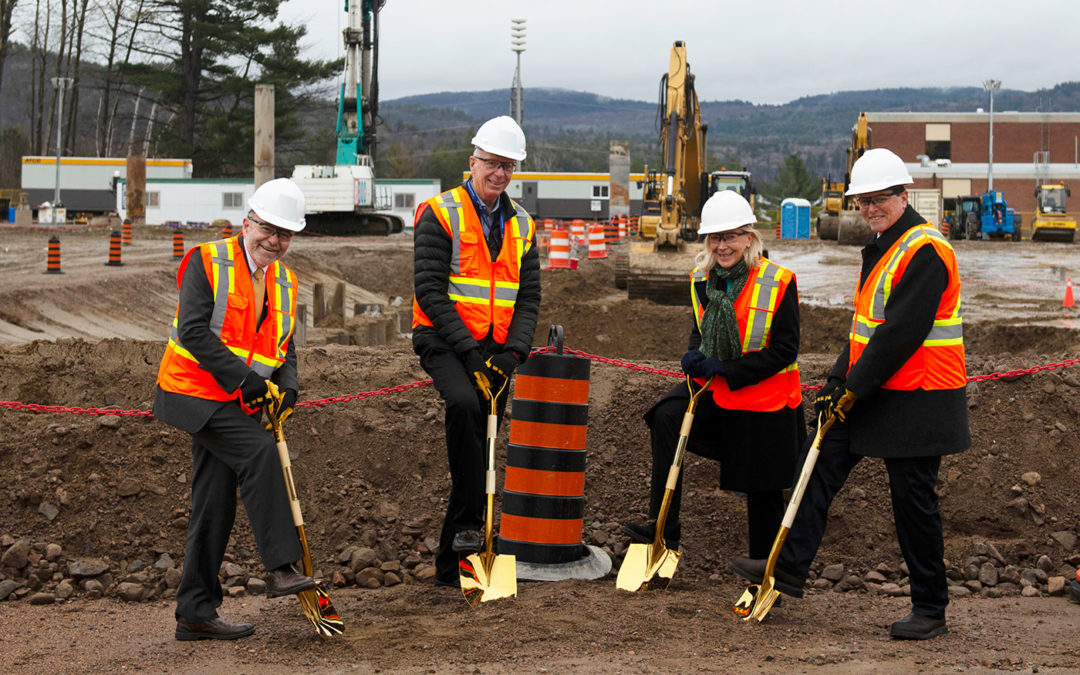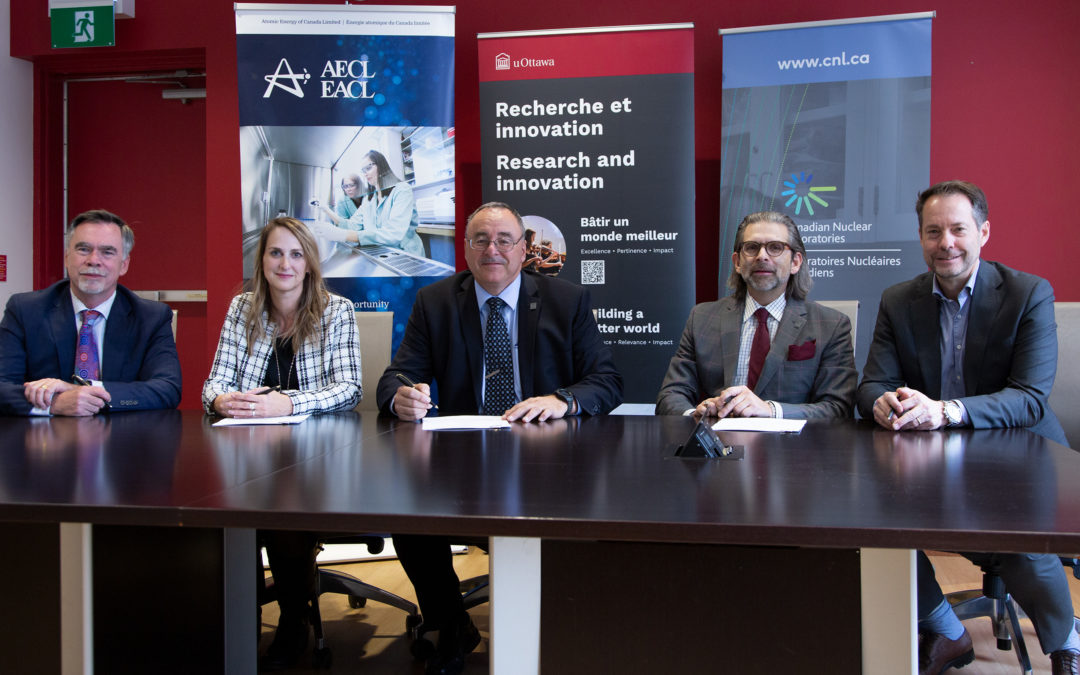
Chalk River | Dec 7, 2022
Canada’s nuclear leaders gather to celebrate construction
of the Advanced Nuclear Materials Research Centre (ANMRC)
Atomic Energy of Canada Limited (AECL) and Canadian Nuclear Laboratories (CNL) officially broke ground on the new Advanced Nuclear Materials Research Centre (ANMRC) at the Chalk River Laboratories. AECL President & CEO, Fred Dermarkar, and CNL President & CEO, Joe McBrearty, were joined by local officials and representatives of Canada’s nuclear supply chain to celebrate construction of the new facility.
The ANMRC will be one of the largest nuclear research facilities in Canada. It will house 23 laboratories, accommodate 160 employees and consolidate key capabilities from aging facilities scheduled for decommissioning at the site. The structure is scheduled for completion in the spring of 2028.
The ANMRC will support Canada’s clean energy goals by providing services critical to the life extension and long-term reliability of existing reactors, including Canada’s fleet of CANDU® reactors and other designs from around the world. The facility will feature 12 new shielded hot cells that will enable post-irradiation examination of small modular reactors (SMR) and next-generation nuclear fuels in addition to glovebox facilities to support the development of advanced fuel fabrication concepts.
The ANMRC is a key component of the revitalization of Chalk River Laboratories, a $1.2B investment by the Government of Canada.
Fred Dermarkar, President & CEO, Atomic Energy of Canada Limited
“ANMRC is central to AECL’s vision to drive nuclear innovation. It will be a modern, efficient, world-class nuclear lab to serve the needs of the Government of Canada and the Canadian nuclear industry – not only for today, but for decades into the future.”
Joe McBrearty, President & CEO, Canadian Nuclear Laboratories
“The investments that the Government of Canada has made to revitalize Chalk River Laboratories give us the facilities and infrastructure needed to confront some of the nation’s most pressing issues, from climate change to energy security. The ANMRC is at the centre of this vision.”
The Honourable Jonathan Wilkinson, Minister of Natural Resources
“To fight climate change and lower emissions, we must look to all non-emitting sources of energy, which very much needs to include nuclear energy. The Advanced Nuclear Materials Research Centre (ANMRC) is an important step forward in Canada’s long history as a peaceful user of nuclear power. The work undertaken here will help guide a new generation of nuclear technologies and ensure that our nuclear sector remains a reliable, safe, cost-effective and innovative source of energy and opportunity.”

Nov 29, 2022
Atomic Energy of Canada Limited (AECL) and Canadian Nuclear Laboratories (CNL) have signed Memoranda of Understanding (MOU) with Ontario Tech University and McMaster University that will advance collaborative research in health and environmental sciences, clean energy, and nuclear safety. This follows another MOU signed earlier this fall with the University of Ottawa and, together, create a strong framework for AECL and CNL to build closer and consistent relationships with Canada’s academic institutions.
These agreements will promote knowledge mobilization and spur innovation and the development of intellectual property. The MOUs will encourage academic institutions to work alongside AECL and CNL to conduct joint research programs, create the conditions to train a highly qualified workforce, and share access to specialized infrastructure.
Together, AECL, CNL and McMaster operate some of the most unique and advanced nuclear facilities and research laboratories, not just in Canada, but around the world. The McMaster Nuclear Reactor, which is used to conduct research and produce medical isotopes, is considered the most powerful research reactor at any Canadian university. Meanwhile, the Chalk River Laboratories, which is managed by CNL on behalf of AECL, is home to a wide range of advanced nuclear research facilities that enable nuclear fuel development and testing, biological research, analytical chemistry, thermalhydraulics and mechanical testing. AECL, CNL and McMaster University share a long history working together to advance Canadian nuclear science and technology, which laid the groundwork for this MOU.
Ontario Tech University is the only Canadian university with an accredited Nuclear Engineering undergraduate program, which is the third largest in North America. The university plays a critical role in training the next generation of nuclear scientists, engineers and operators. Together, the organizations will explore opportunities to develop undergraduate and graduate learning experiences in the form of co-op and internship placements; encourage mentorship and networking programs for students; establish employment mechanisms for graduates and alumni; and facilitate the development of research chairs and research teams.
Quotes:
“AECL is proud to announce these partnerships with Ontario Tech University and McMaster University,” says Dr. Amy Gottschling, AECL’s Vice President, Science, Technology & Commercial Oversight. “This is an exciting opportunity which helps fulfil our mandate at AECL – to enable nuclear science and technology in a strategic way with strong academic partners.”
“CNL has made it an organizational priority to work closer with Canada’s academic community,” said Dr. Jeff Griffin, CNL’s Vice-President of Science and Technology. “Working in partnership with Ontario Tech University and McMaster University allows us to pool our financial resources, accelerate early-stage research, facilitate the transfer of knowledge, and work together to address the needs of the nuclear industry and the federal government.”
“Ontario Tech University is excited to enter this agreement with both AECL and CNL in strategic areas that include small modular reactors, hydrogen, and integrated energy systems,” said Dr. Les Jacobs, Vice-President of Research and Innovation at Ontario Tech University. “Through our strong history of energy and nuclear research expertise and programming, Ontario Tech plays a unique energy industry role as a developer of future talent and business solutions creator.”

Nov 25, 2022
Atomic Energy of Canada Limited signed a Memorandum of Understanding (MOU) with Canadian Nuclear Laboratories (CNL) and the University of Ottawa to identify and pursue collaborative research opportunities. Building on decades of work together, the MOU formalizes what has been a longstanding relationship between the organizations to facilitate joint research projects, foster the professional development of highly qualified personnel, and encourage shared access to specialized infrastructure. The objective is to advance research in health and environmental sciences, clean energy and nuclear safety.
Among the many promising areas of research identified within the agreement are studies related to radiobiology, epigenetics, environmental impacts on natural systems, cybersecurity, and hydrogen production, storage and safety. Together, the three organizations hope that the MOU will help cultivate closer relationships between their respective researchers, enable knowledge mobilization, spur innovation and the development of intellectual property, and advance solutions to address both national and industry challenges.
“Alongside CNL, AECL is incredibly excited to enter into this agreement with the University of Ottawa, an organization which shares our passion for research, innovation and entrepreneurship,” commented Amy Gottschling, Vice-President, Science, Technology & Commercial Oversight, AECL. “As Canada’s national nuclear laboratory, one of our core objectives is to work with the academic community to advance Canadian science and technology and turn research into reality. This objective is at the heart of this agreement with the University of Ottawa, and we are confident that our work will yield results that offer real, meaningful benefits for Canadians.”
“The University of Ottawa is a key partner in supporting CNL and AECL as they apply their strengths in nuclear science and technology to tackle some of greatest challenges our world is facing,” said uOttawa Vice-President, Research and Innovation Sylvain Charbonneau. “We share their determination to be agile and to seize every opportunity to continually push back the frontiers of research and development.”
“While we have always maintained strong relationships with the academic community, it is a growing organizational priority for CNL to establish closer relationships with leading academic institutions like the University of Ottawa as part of our new vision,” commented Dr. Jeff Griffin, CNL’s Vice-President of Science and Technology. “Over the past few years, we saw first-hand how valuable collaborative research is to this country, as Canada’s science and technology community mobilized to reduce the worst impacts of the pandemic. Given the enormous challenges we face as a country, it benefits everyone to share resources and work together towards common goals. What’s more, we need to help foster the future researchers, engineers, and multitude of other professionals who will continue to advance this critical work.”
The agreement with the University of Ottawa builds on what has been a long and productive relationship between the organizations that dates back decades, and which represents an important step in AECL and CNL’s efforts to foster closer ties with Canada’s academic community. The MOU is designed to establish a closer and more consistent relationship between the organizations, including ongoing engagements between researchers to identify and explore potential collaboration opportunities.



